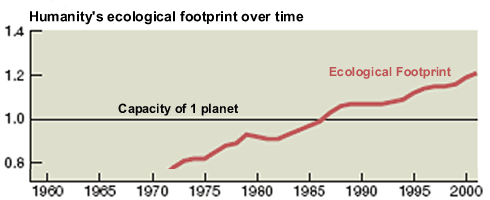

|
| weblog/wEssays archives | home | |
|
The China Syndrome: Growth at Any Cost (November 20, 2006)  Frequent contributor Michael Goodfellow was kind enough to send this link to an excellent
New York Times article on China's Yellow River:
A Troubled River Mirrors China’s Path to Modernity.
Frequent contributor Michael Goodfellow was kind enough to send this link to an excellent
New York Times article on China's Yellow River:
A Troubled River Mirrors China’s Path to Modernity.
Even occasional readers know that I have often written about China, for its emergence from the dark gloom of the "Bamboo Curtain" and the self-inflicted catastrophe of the Cultural Revolution is truly the "story of the century." (Please see China: An Interim Report and other stories in the left sidebar under "Unfolding Crises: Asia.") The themes I have written about are well-illustrated in this story of the Yellow River: 1. The pervasively gross misallocation of capital in China (for instance, the glorious gambles on massive "international city" centers far from transportation hubs) 2. The distorting influence of corruption (for example, the millions of acres stolen by local governments to be sold at a hefty profit to developers) 3. The possibly uncorrectable environmental degradation which stems from rampant development and corruption (as described in this article and many others, factories which only begin spewing toxins after dark, so they escape "official" notice) The problem is not just China's but the Earth's, for the limits of growth are already upon us. Take a look at this chart and then read this excerpt from this week's Barron's interview with Lyric and David Hale: 
Right now, Americans have 148 million cars, the Chinese 19 million. and the Indians, all billion of them, have 9 million cars. By 2050, Goldman Sachs projects the Americans will have 233 million cars, the Chinese will have 514 million cars, and the Indians will have 610 million cars. The Americans with 148 million cars already consume one-quarter of the world's oil.Yes, yes, I know, the miracles of the free market will send the internal combustion, petroleum-based, steel-frame car to the scrapheap of history. But 2 billion cars--for let's not forget to add auto-mad Europe or the rest of Asia to their estimate--is a lot of something, even if it isn't oil or steel: carbon fibers, hydrogen fuel-cells, batteries, or whatever solution you believe will win out. And the energy required to fabricate those technologies will still be stupendous. As a result, we all have a stake in China's rush to modernize and employ its hundreds of millions of previously rural subsistance workers. What is not stated openly (or at least not very often) is this: China only gets one chance to get it right. Right now, global warming is reducing the watershed of the Yellow River. If they mismanage their water assets (rivers and aquifers), they won't get a second chance. If they misallocate all the billions being poured into factories, city centers and infrastucture, there won't be another trillion dollars available to waste on absurd mega-projects or shoddily constructed infrastructure. The global economy will turn to other, even cheaper sources of labor, just as it has always done. China's task (and India's as well) is unprecedented. In the same issue of Barron's, a story covered a University of California at Irvine study which sought to quantify China's competitive advantages: low labor costs, and so on. The article states: Astonishingly, counterfeiting and piracy are worth up to a third of China's gross domestic product, according to some estimates. This makes a government crackdown on a phenomenon which creates millions of jobs exceedingly unlikely.That is putting it politely. If you were one of China's leaders, which would you make a priority: throwing all those counterfeiters of Hollywood movies, Microsoft software, European luxury goods, pharmaceuticals, Japanese motorcycles, etc. etc. etc. in jail, or wink at their "growth industries" as they hire millions of restive peasants? It will be a close race. Can China grow fast and smart enough to satisfy its millions of workers who are currently left out of all the prosperity of the coast? Can they develop sustainable resources before they run out of air and water? Can they do all this before the population ages? (see "Fewer" in recommended books for more on the consequences of their "one child" policy of the past 20 years.) If any of these issue blows up--political unrest, environmental collapse, financial decline--then all bets are off for a stable, prosperous China. For more on this subject and a wide array of other topics, please visit my weblog. copyright © 2006 Charles Hugh Smith. All rights reserved in all media. I would be honored if you linked this wEssay to your site, or printed a copy for your own use. |
||
| weblog/wEssays | home |